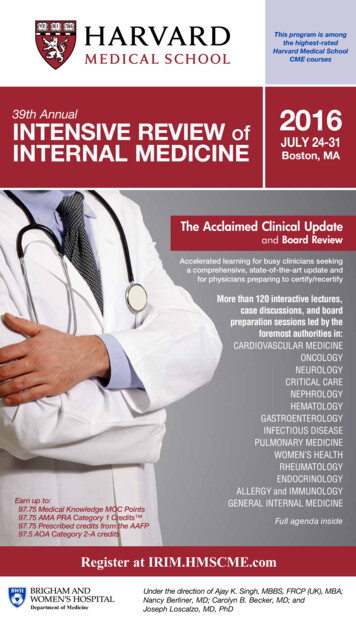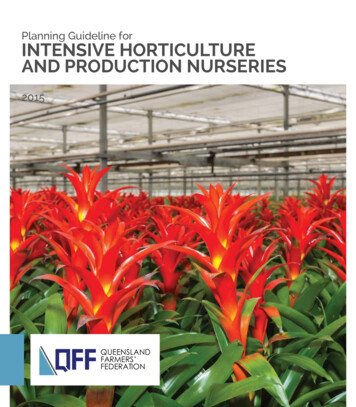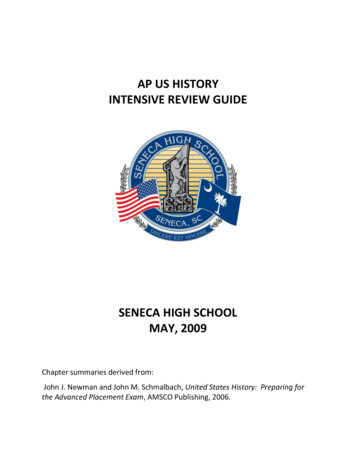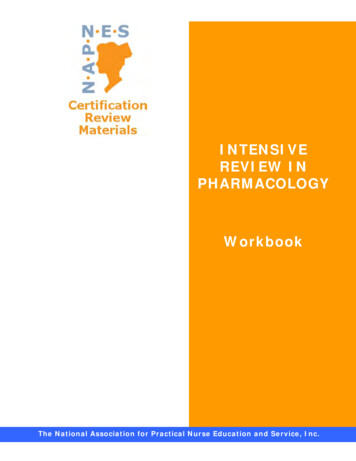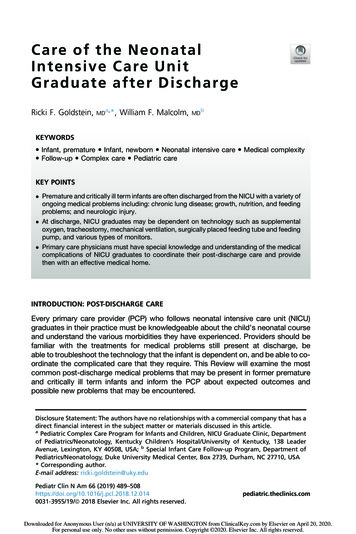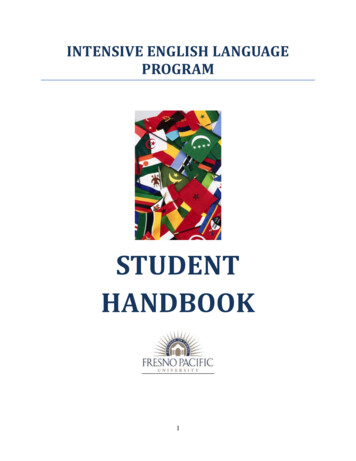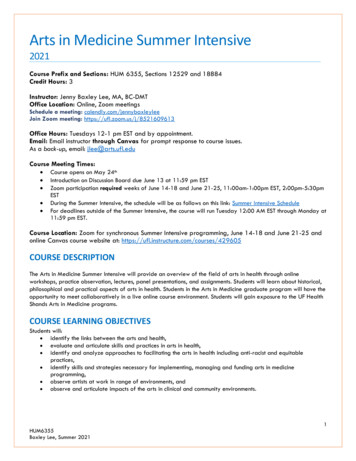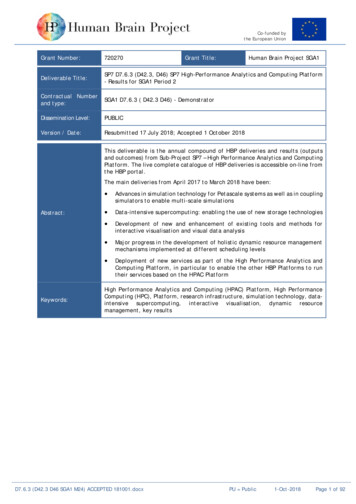
Transcription
EUROPEAN ACADEMIC RESEARCHVol. III, Issue 7/ October 2015ISSN 2286-4822www.euacademic.orgImpact Factor: 3.4546 (UIF)DRJI Value: 5.9 (B )The Impact of Intensive Reading on Improving EFLLearners' Speaking SkillsABDALLAH ADAM OSMAN ALGAZOLYDepartment of English, College of LanguagesSudan University of Science and TechnologyKhartoum, SudanTAJ ELSSIR HASSAN BASHOUMCollege of LanguagesSudan University of Science and TechnologyAbstract:The study aims to investigate the impact of intensive readingon improving EFL learners' speaking skill. To achieve the aims of thestudy the researcher has used the descriptive and analytical method.The subject of this study is teachers of English Language fromdifferent representative of Sudanese Universities who have longexperience in teaching English as a foreign language, and forty of themhave been taken as a sample of the study. The researcher has used aquestionnaire to collect the relevant data. Then, he has used thestatistical program (SPSS) to analyze these data. After analyzingthem, the researcher has come to: students can improve and developthemselves in speaking skill when they are reinforcing their readingskill and this view strongly supported by 90% of teachers who havelong experience in the same field of teaching English as a foreignlanguage. In addition to that the majority of teachers assured thatstudents can achieve their accuracy and fluency in oral communicationthrough intensive reading. And the researcher has recommended thatstudents must be exposed to different components of topics in intensivereading so as to develop their speaking skill and teachers mustconsider the aspects of accuracy and fluency when students' exposed tointensive reading so as to develop them respectively.8265
Abdallah Adam Osman Algazoly, Taj Elssir Hassan Bashoum- The Impact ofIntensive Reading on Improving EFL Learners' Speaking SkillsKey words: intensive reading,knowledge, fluency, accuracySpeakingskills,vocabulary1. INTRODUCTIONLanguage is a formal system of signs governed by grammaticalrules of combination to communicate meaning. This definitionstresses the fact that human languages can be described asclosed structural systems consisting of rules that relateparticular signs to particular meanings (Bloomfield, 1914). So,one can say that Language is basically speech. It is universalamong human beings who use it for carrying out variousactivities of life. In addition to that Language acquisitionwithout reading is so difficult, because reading is a good way ofcomprehension. A good reader is able to understand sentencesand structures of a written text and transfer them into oralcommunication. Students through reading can develop in bothfluency and accuracy of expression in their speaking skill.Davies and Pearse (2000) stress the importance ofcommunication as: “Real success in English teaching andlearning is when the learners can actually communicate inEnglish inside and outside the classroom.2. SPEAKINGSpeaking is how to interact the process of constructing meaningthat involves producing and receiving and processinginformation. As stressed by (Brown, 1994; Burns & Joyce,1997). This form and meaning of speaking are dependent on thecontext in which it occurs; it's including the participantsthemselves, their collective experiences, the physicalenvironment, and the purposes for speaking. It is oftenspontaneous, open-ended, and evolving However, speech is notalways unpredictable.EUROPEAN ACADEMIC RESEARCH - Vol. III, Issue 7 / October 20158266
Abdallah Adam Osman Algazoly, Taj Elssir Hassan Bashoum- The Impact ofIntensive Reading on Improving EFL Learners' Speaking SkillsSpeaking can help students to develop their vocabulary andgrammar and then improving their writing skill. Withspeaking, learners can express their personal feeling, opinionsor ideas; tell stories; inform or explain; request; converse anddiscuss, i.e. through speaking, people can display the differentfunctions of language. Speaking is very important outsideclassroom as well. Many companies and organizations look forpeople who speak English very well for the purpose ofcommunicating with other people. So, speakers of foreignlanguages have more opportunities to get jobs in suchcompanies. Baker and Westrup (2003: 05) support that “astudent who can speak English well may have greater chancefor further education, of finding employment and gainingpromotion.”Nowadays, along with the strengthening position ofEnglish as a language for international communication, theteaching of speaking skill has become increasingly important inthe English as a second or foreign language (ESL/EFL) context.The teaching of speaking skill is also important due to the largenumber of students who want to study English in order to beable to use English for communicative purposes. In recentteaching context, a lot of attention has been paid to designactivities which focus more on tasks that are balanced betweenthe need to achieve fluency and accuracy. These criteria arealso based upon in the assessment of the oral skills.In the communicative approach, fluency and accuracyare of the main characteristics of this approach, and they areseen as complementary in accomplishing a given task. AlthoughRichards and Rodgers (2001: 157) mention that “fluency andacceptable language is the primary goal: Accuracy is judged notin the abstract but in context”,Many questions have been raised about the role ofaccuracy in Communicative Language Theory (CLT). Hedge(2000: 61) emphasizes the importance of speaking, pointing outthat “The communicative approach somehow excuses teachersEUROPEAN ACADEMIC RESEARCH - Vol. III, Issue 7 / October 20158267
Abdallah Adam Osman Algazoly, Taj Elssir Hassan Bashoum- The Impact ofIntensive Reading on Improving EFL Learners' Speaking Skillsand learners from a consideration of how to develop high levelsof accuracy in the use of grammar, pronunciation, andvocabulary.” Learners then should develop a wever,simultaneously they should know how the language systemworks in a correct and appropriate way.2.1 FluencyThe main goal teachers wish to achieve in teaching theproductive skill of speaking is oral fluency; it is the maincharacteristics of the speaker performance. Hughes (2002)defines fluency as the ability to express oneself in anintelligible, reasonable and accurate way without too muchhesitation; otherwise the communication will break downbecause listeners will lose their interest. To achieve this goal,teachers then should train learners to use their personallanguage freely to express their own ideas and then avoidimitations of a model of some kind. Hedge Tricia (2000: 54)adds also that “The term fluency relates to the production andit is normally reserved for speech. It is the ability to link unitsof speech together with facility and without strain orinappropriate show-ness, or undue hesitation.”One can say, it is the ability to respond in a coherentway through linking the words and phrases effectively,pronounce the sounds clearly, using stress and intonation, i.e.doing all of these quickly. Hughes (2002) supports also thatfluency and coherence refer to the ability to speak in a normallevel of continuity, rate and effort in addition to link the ideastogether in a coherent way. Speech rate and speech continuityare the key indicators of coherence.Many of second language speakers think of fluency asthe ability to speak fast, that is why they start speaking rapidlywithout pauses. Thornbury, (2005) argues that speed is animportant factor in fluency and pausing too, because speakersneed to take breath. Native speakers also need to pause fromEUROPEAN ACADEMIC RESEARCH - Vol. III, Issue 7 / October 20158268
Abdallah Adam Osman Algazoly, Taj Elssir Hassan Bashoum- The Impact ofIntensive Reading on Improving EFL Learners' Speaking Skillstime to time in order to let the interlocutors catch what theysaid. However, a frequent pausing is an indication that thespeaker has problems of speaking. In such cases Thornburysuggests what is called „tricks‟ or production strategies, i.e. theability to fill the pauses. The most common pause fillers are“uh” and “um”, vagueness expressions such as “short of” and “Imean”. Another device for filling the pauses is the repetition ofone word when there is a pause.2.2 AccuracyMost second language teachers nowadays put emphasis on theterm of accuracy in their teaching because learners seek moreto be fluent and they forget about being accurate. Withoutstructuring accurate speech, speakers will not be understoodand their interlocutors will lose interest if they performincorrect utterances each time. Therefore, paying attention tocorrectness and completeness of language form is of moreimportance for oral proficiency. (Skehan 1996: 23 cited in Ellisand Barkhuizen 2005: 139) define accuracy as referring “to howwell the target language is produced in relation to the rulesystem of the target language.3. READINGReading is one of the most effective ways of foreign languagelearning. Reading simply is the interpretation of a writtenmessage. Walter R. Hill (1979, p.4) briefly defines reading aswhat the reader does to get the meaning he needs fromcontextual resources. Reading is a fluent process of readerscombining information from a text and their own backgroundknowledge to build meaning and the goal of reading iscomprehension (Nunan, 2003, p.68). The ability to read requiresthat the reader draw information from a text and combine itwith information and expectations that the reader already has(Grabe, Stoller, 2001, p.187). Alderson J.C. (2000) states thatEUROPEAN ACADEMIC RESEARCH - Vol. III, Issue 7 / October 20158269
Abdallah Adam Osman Algazoly, Taj Elssir Hassan Bashoum- The Impact ofIntensive Reading on Improving EFL Learners' Speaking Skillsreading is built from two components: word recognition andcomprehension. These two components gained through readingwill foster learners‟ language competence. Krashen and Terrell(1989, p.131) point out that reading enables learners tocomprehend better which is an important factor that candevelop language competence.Hedge (2003) writes the goals of learners‟ in a readingprocess as: The ability to read a wide range of texts in English. Building knowledge of language which will facilitatereading ability. Building schematic knowledge. The ability to adapt the reading style according to readingpurpose (skimming, scanning). Developing an awareness of the structure of written textsin English. Taking a critical stance to the contexts of the texts.Reading will add to learners‟ conversational performance.Reading will help learners to decipher new words that theyneed for conversations. Through reading language learners willhave vocabulary knowledge which will facilitate their speakingperformance and their usage of structure in the target languagewill develop. These components which are required throughreading are all necessary for developing speaking skills.Similarly, Williams (1984, p.13) suggests some reasons whylanguage learners should read in a foreign language: Learners can have further practice in the language thatthey have learnt, Learners can practice language in order to reuse it in otherskills such as speaking and writing, Learners can learn how to get benefit from the texts toextract the information they need, Learners can find enjoyment or interest through reading.EUROPEAN ACADEMIC RESEARCH - Vol. III, Issue 7 / October 20158270
Abdallah Adam Osman Algazoly, Taj Elssir Hassan Bashoum- The Impact ofIntensive Reading on Improving EFL Learners' Speaking SkillsSanacore (1994, p.604), is of the opinion that encouraginglearners to read will lead them guessing the meanings of words,phrases from the context, and the more they read the more theywill understand the meanings of sentences and concepts. Andan ongoing reading habit will enable learners understand a texteasily; even they do not know meanings of some words in thetext. Reading extensively will enhance their comprehension.Learners will easily comprehend in the foreign language if theyadvance their ability of guessing the meanings of words fromcontext which will promote their speaking performance. Indeed,reading power relies on continuous improvement in vocabularyknowledge that provides oral communication and givesstudents self-confidence to practice English. The importance ofword knowledge, which facilitates speaking skills, has been amajor resource in the development of reading skills. Thereforefostering improvement in word knowledge through widereading has the potential for fostering improvement in speakingskills. In addition to that intensive reading is a good classroomactivity carried on under the guidance of the teacher. It ismainly concerned with texts and involves focusing upon newwords, structures, expressions, functions, pronunciations, andon cultural insights. It is carefully guided so that thoroughunderstanding of the content can be reflected in students' oralcommunication.4. AIMS OF THE STUDYThe paper aims to identify The Impact of Intensive Reading onImproving EFL Learners' Speaking skills; in particular toinvestigate the two terms of fluency and accuracy which one isimprove better than other in the application of intensivereading.EUROPEAN ACADEMIC RESEARCH - Vol. III, Issue 7 / October 20158271
Abdallah Adam Osman Algazoly, Taj Elssir Hassan Bashoum- The Impact ofIntensive Reading on Improving EFL Learners' Speaking Skills5. OBJECTIVES OF THE STUDYThe study aims to find out the areas of weakness and strengthof students' performance in order to reinforce the strength andfind solution of weakness to provide practical ways for boostingthe students' self-confidence.6. METHODSThe researcher provides description of the study methodology,specifically the research tools utilized for data collection whichincludes the measuring instruments, the population (subjects)the procedures and the statistical analysis applied in the study.The researcher has followed the descriptive analytic method.He has used (SPSS) (statistical package social science) programto analyze the data. The study was designed to answer thefollowing question;1- Which aspect of speaking improves better thanothers, accuracy or fluency as a result of theapplication of intensive reading?6.1 SubjectsThe subjects of the study have composed from teachers ofEnglish language in some representative SudaneseUniversities, they have been teaching English as a foreignlanguage at the departments of English language andlinguistics for long time.6.2 SampleForty teachers were randomly selected from different Sudaneserepresentative Universities. And all of them have been teachingEnglish as a foreign language.EUROPEAN ACADEMIC RESEARCH - Vol. III, Issue 7 / October 20158272
Abdallah Adam Osman Algazoly, Taj Elssir Hassan Bashoum- The Impact ofIntensive Reading on Improving EFL Learners' Speaking Skills6.3 InstrumentsThe researcher has used a questionnaire as an instrument forcollecting relevant data of the study. The questionnaire wasdesigned on liker scale of five points. (Strongly Agree, Agree,Neutral, Disagree, and Strongly Disagree). Before thequestionnaire could be given to the universities teachers, it wasexposed to the long experienced teachers to judge it. Aftertryout and piloting, the questionnaire had become a valid toolto collect the relevant data.6.4 Data Collection and AnalysisThe researcher was distributed forty questionnaires to the fortyteachers by hand and he collected their questionnaires andanalyzed them by using (SPSS). Then, the answers which hadgiven to the questionnaires were descriptively analyzed andpresented in the findings below.6.4 Findings and DiscussionVariable 1: (As students develop stronger reading skills, theyfurther develop more speaking skills).Table (1)Variable 1Strongly 314040.%50.%7.5%2.5%100.%According to the table (1) above, it shows that 16 teachers havechosen the alternative strongly agree which represent 40% and20 of them have responded agree which represent 50% while 3teachers have chosen the alternative neutral which represent7.5% whereas 1 teacher had chosen disagree which represent2.5%. From the explanation above 36 teachers have respondedEUROPEAN ACADEMIC RESEARCH - Vol. III, Issue 7 / October 20158273
Abdallah Adam Osman Algazoly, Taj Elssir Hassan Bashoum- The Impact ofIntensive Reading on Improving EFL Learners' Speaking Skillsthe alternative strongly agree and agree which represent 90%from the whole sample. From these interpretations I can able tosay that students can improve and developing themselves inspeaking skill when they are developing and improving theirreading skill and this view strongly supported by 90% of theteachers who have long experience in the same field of teachingEnglish as a foreign language.Variable 2: (In intensive reading, the learners' accuracy can beachieved in oral communication).Table (2)Variable 2Strongly 824037.5%37.5%20.%5.%100.%From the table (2) above the answers of teachers like this; 15teachers have chosen the alternative strongly agree it means37.5% and 15 teachers selected agree which represent 37.5%while 8 teachers neutral it means 20% and 2 of them disagreewhich represent 5%. from the explanation above 30 teachershave chosen strongly agree and agree which represent 75%from the whole sample. So, I can say that the variable isstrongly supported by the majority of teachers this means thatstudents can achieve their accuracy in oral communicationthrough intensive reading. And this is assured by: (Nunan,2003). (Harmer, 2001) note down that from the communicativepoint of view, speaking has many different aspects includingtwo major categories – accuracy, involving the correct use ofvocabulary, grammar and pronunciation practiced throughcontrolled and guided activities; and, fluency, considered to be„the ability to keep going when speaking spontaneously‟. Bygate(1991) also emphasizes knowledge of the language, and skill inEUROPEAN ACADEMIC RESEARCH - Vol. III, Issue 7 / October 20158274
Abdallah Adam Osman Algazoly, Taj Elssir Hassan Bashoum- The Impact ofIntensive Reading on Improving EFL Learners' Speaking Skillsusing this knowledge for an effective communication. Languageknowledge and skill in using it are considered two fundamentalelements of an effective communication.Variable 3: (Teachers give little attention to intensive readingtherefore; students are weak in speaking skill).Table (3)Variable 3Strongly 614045.%37.5%15.%2.5%100.%According to the table (3) above the teachers indicate that 18teachers have responded the alternative strongly agree whichrepresent 45% and 15 of them have chosen agree whichrepresent 37.5% while 6 teachers have decided neutral it means15% whereas only 1 teacher had chosen disagree whichrepresent 2.5%. It is very clear that 33 teachers have chosen thealternative strongly agree and agree which represent 82.5%this means that the majority of them accepted and supportedthe variable which is saying" teachers give little attention tointensive reading therefore; students are weak in speakingskill". So, teachers must focus and concentrate on intensivereading so as to reinforce their students' ability in speakingskill, otherwise they will remain weak in their talking. Asintensive reading is used around the world it is believed that inteaching reading comprehension intensive reading can bebeneficial to expand reading comprehension (Yang, Dai, & Gao,2012). Waring (1997) argues that intensive reading is veryuseful for learning vocabulary and understanding how text isorganized. Stahl (2003) found that there is relationship betweenintensive reading activities and overall language proficiency.Some scholars believe that some students who find readingEUROPEAN ACADEMIC RESEARCH - Vol. III, Issue 7 / October 20158275
Abdallah Adam Osman Algazoly, Taj Elssir Hassan Bashoum- The Impact ofIntensive Reading on Improving EFL Learners' Speaking Skillsdifficult cannot successfully derive the meanings of words aswell as those who are at higher level of vocabulary knowledge.Variable 4: (Students read intensively to develop fluency intheir speaking skill).Table (4)Variable 4Strongly 34017.5%52.5%22.5%7.5%100.%From the table (4) above, it shows that 7 teachers haveresponded the alternative strongly agree which represent 17.5%and 21 teachers have chosen agree which represent 52.5% while9 teachers have chosen neutral which represent 22.5% whereas3 of them have chosen disagree which represent 7.5%. So, fromthe above interpretation 28 teachers have responded thealternative strongly agree and agree which represent 70% fromthe whole sample and this means that the majority of teachershave strongly supported and accepted the variable. Therefore,students must read intensively to recognize new vocabulary,pronunciation of new words, expressions etc. this is actuallywill raise their capabilities to develop and reinforce theirspeaking fluency.Variable 5: (Students learn new vocabulary from text is crucialto enhance their speaking skill).Table (5)Variable (5)Strongly 424037.5%47.5%10.%5.%100.%EUROPEAN ACADEMIC RESEARCH - Vol. III, Issue 7 / October 20158276
Abdallah Adam Osman Algazoly, Taj Elssir Hassan Bashoum- The Impact ofIntensive Reading on Improving EFL Learners' Speaking SkillsThe table (5) shows that 15 teachers have chosen strongly agreewhich represent 37.5% and 19 of them have responded agreewhich represent 47.5% while 4 teachers have selected neutral itmeans 10% whereas 2 teachers have chosen disagree. From theabove explanation there are 34 teachers have responded thealternative strongly agree and agree which represent 85% andthis means that the majority of them supported and acceptedthe variable. Therefore; students can learn new vocabularyfrom text to enhance their speaking skill. Because, vocabularyknowledge indispensable for effective communication. Lewis(1993, p.2) writes that learning vocabulary is the core task insecond language learning and any language skills of listening,speaking, reading, writing, and translating cannot existwithout vocabulary. Vocabulary understands the meaning of aword, so communication does not occur if there are no words.Therefore reading is probably the best way to learn new words.Reading results in incidental vocabulary acquisition(Lechmann, 2007). Nation supports this idea and says:“Reading has long been seen as a major source of vocabularygrowth” (Nation, 1995, p.7). Most people recognize theimportant relationship between knowing words and readingwell. Eskey, supporting this notion, states that “therelationship between reading and vocabulary is welldocumented and reciprocal” (Eskey, 2005, p.567). And, “in factthe relationship between vocabulary knowledge and readingcomprehension is well established in the reading literature”(Dole, Sloan, Trathen, 1995, p.452). Hedge (1985, p.77) alsostates that through extensive reading learners advance theirability to of guessing the meanings of unknown words andphrases from clues in the context and he concludes thatstudents who read a lot outside the classroom may increaseboth their comprehending the context and improving theirvocabulary which are essential elements to advance speakingskills. Students' performance in speaking can be raised whentheir teachers give them intensive reading materials fromEUROPEAN ACADEMIC RESEARCH - Vol. III, Issue 7 / October 20158277
Abdallah Adam Osman Algazoly, Taj Elssir Hassan Bashoum- The Impact ofIntensive Reading on Improving EFL Learners' Speaking Skillsdifferent topics because these topics enable them to recognizedifferent things and enlarge their repertoire which reflected intheir speaking skill. And this point of view strongly supportedand accepted by Koizumi (2005).RECOMMENDATIONS Students must be exposed to different components of topicsin intensive reading so as to develop their speaking skill.Teachers must consider the aspects of accuracy and fluencywhen students' exposed to intensive reading so as to developthem respectively.Teachers must focus and concentrate on intensive readingmore and more to reinforce their students' ability inspeaking skill; otherwise they will remain weak in theirtalking. As intensive reading is used around the world it isbelieved that in teaching reading comprehension intensivereading can be beneficial to expand reading comprehensionand it leads to good oral communication.Teachers must encourage students to read intensively torecognize new vocabulary, pronunciation of new words,expressions etc. this is actually will raise their capabilitiesto develop and reinforce their speaking fluency.REFERENCESAlderson, J. C. (2000). Assessing Reading. Cambridge:Cambridge University.Brown, H.D. (1994). Teaching by principles: an interactiveapproach to language pedagogy. Englewood Cliffs, NJ:Prentice Hall Regents.Burns, A. & Joyce, H. (1997). Focus on speaking. Sydney:National Center for English Language Teaching andResearch.EUROPEAN ACADEMIC RESEARCH - Vol. III, Issue 7 / October 20158278
Abdallah Adam Osman Algazoly, Taj Elssir Hassan Bashoum- The Impact ofIntensive Reading on Improving EFL Learners' Speaking SkillsBygate, M. (1991). Speaking. Oxford: Oxford University Press.Celce-Murcia (Ed.), Teaching English as a second foreignlanguage. Boston: Heinle and Heinle.Grabe, W., & Fredricka S. (2001). Reading for AcademicPurposes Guidelines for the ESL/EFL Teacher. In M.Harmer, J. (2001). The Practice of English Language Teaching.Harlow: Pearson Education.Hedge, T. (2003). Teaching & learning in the languageClassroom. UK: OUP.Hill, W. R. (1979). Secondary School Reading: Process,Program, Procedure. Boston: Allyn and Bacon.Krashen, S. D., & Terrell, T. D. (1989). The Natural Approach:Language Acquisition in the Classroom. Pergamon:Prentice Hall.Lewis, M. (1993). The Lexical Approach. London: LanguageTeaching Publications.Nunan, D. (2003). Practical English Language Teaching.Boston: McGraw Hill.Richards, J. C., & Renandya, W. A. (Eds.). (2002), Methodologyin language teaching. Cambridge: Cambridge UniversityPress.Sanacore, J. (1994). Lifetime Literacy through IndependentReading: The Principal is a Key Player. InternationalReading Association. Journal of Reading, 37(7), 602606.Thornbury, S. (2005). How to teach speaking. Harlow, England:Longman.Williams, E. (1984). Reading in the Language Classroom.London: Macmillan Publishers Ltd.EUROPEAN ACADEMIC RESEARCH - Vol. III, Issue 7 / October 20158279
Intensive Reading on Improving EFL Learners' Speaking Skills EUROPEAN ACADEMIC RESEARCH - Vol. III, Issue 7 / October 2015 8266 Key words: intensive reading, Speaking skills, vocabulary knowledge, fluency, accuracy 1. INTRODUCTION Language is a formal system of signs governed by

